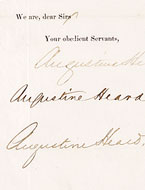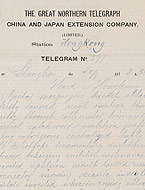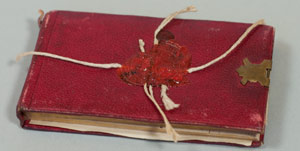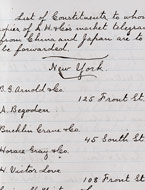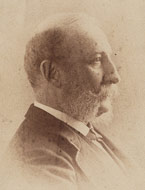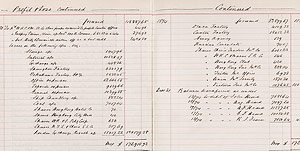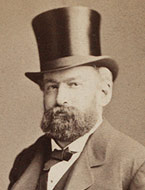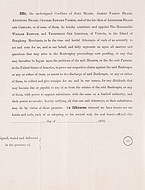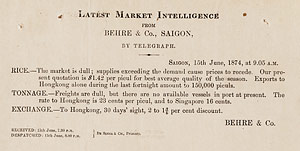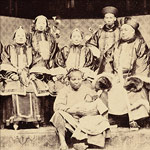
When I compare our meager list of constituents of the past two years with what it used to be, I feel very blue & downhearted. It seems as if we had reached the pinnacle of our glory, & were now toppling over.
— Albert Heard to Augustine Heard II, June 3, 186138Chinese Competition and Emerging Technologies
Albert Heard served in China from 1862 to 1867 when Augustine Heard II returned to take his place. Their uncle Augustine Heard died a year later at age 83. “I shall not attempt to describe my feelings,” John Heard wrote. “He had been a father to me, and we had lived together so many years, and I had seen so much of his noble traits, that I had the highest admiration for him.”39
During this time the brothers experienced transformations in the firm and the China trade itself. By the 1870s the telegraph brought significant improvements to the way business was transacted, but in many respects it signaled the beginning of the end for Augustine Heard & Co. The new invention reduced the time between orders and transactions, provided more up-to-date information on fluctuations in costs and prices, and secured faster credit from banks. These advances made it less risky for smaller firms to compete and easier for Chinese merchants and compradors to become brokers. “Chinese would similarly displace Westerners in many areas of economic enterprise as they gained skills and developed modern financial and commercial institutions,” Stephen Lockwood contends.40 In addition to adopting modern managerial and financial systems, the Chinese compradors played a significant role in the early industrialization of the country by investing their wealth in modern business enterprises, including steamships, mining, machine manufacturing, and textile mills.41
Other factors hastened Heard & Co.’s decline, including the misappropriation of funds by the house’s agent Everett & Co. The firm also found it difficult to recover from its extravagant ways. “The prosperity of the past had initiated a lavish scale of expenditure. . . . Economies were evidently necessary, but they were very difficult to make,” Augustine Heard, Jr. explained. “[The merchant] . . . hoped that next year would be better, but that next year never seemed to come, and he sunk deeper and deeper till the final catastrophe.”42 Augustine Heard & Co. announced bankruptcy in 1875. The firm raised $30,000 and reopened later that year, but shut down its operations for a final time in 1877.43 The British firm Jardine, Matheson & Co., whose business transactions Heard & Co. had overseen during the First Opium War, took over the company’s operations.
George, the youngest brother to serve in Asia, started his journey home in 1875. “Just before the house in China failed my brother George left for home. He died in the Red Sea from heart trouble,” John Heard wrote. “This news came upon me at a time I was little able to bear it. . . . I had hardly known before that he was ill. I was very fond of him.”44
It was the passing of an era, and other trading houses began to fail. “The New England origin of the trade, its frontier community quality, and the salty excitement of the clipper days were fading away behind banks, telegraph offices, and steamships,” Lockwood argues. “China and the East were being more closely drawn into the mainstream of world trade.”45

